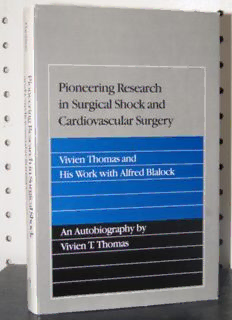
Pioneering Research in Surgical Shock and Cardiovascular Surgery: Vivien T. Thomas and His Work With Alfred Blalock PDF
Preview Pioneering Research in Surgical Shock and Cardiovascular Surgery: Vivien T. Thomas and His Work With Alfred Blalock
Page i Pioneering Research in Surgical Shock and Cardiovascular Surgery Page ii Vivien T. Thomas Page iii Pioneering Research in Surgical Shock and Cardiovascular Surgery Vivien Thomas and His Work with Alfred Blalock An Autobiography by Vivien T. Thomas UNIVERSITY OF PENNSYLVANIA PRESS Philadelphia Page iv Copyright © 1985 by the University of Pennsylvania Press All rights reserved Library of Congress Cataloging in Publication Data Thomas, Vivien T., 1910– Pioneering research in surgical shock and cardio vascular surgery. Bibliography: p. Includes index. 1. Thomas, Vivien T., 1910– . 2. Blalock, Alfred, 1899–1964. 3. Surgeons—Maryland—Biography. 4. Cardiovascular system—Surgery. 5. Shock. 6. Surgery, Experimental. I. Title. [DNLM: 1. Cardiovascular System—surgery—personal narratives. 2. Research—personal narratives. 3. Shock, Surgical— personal narratives. WZ 100 T4627] RD27.35.T46A38 1985 617'.092'4[B] 8513930 ISBN 0812279891 (alk. paper) Printed in the United States of America Page v To Clara Flanders Thomas Page vii CONTENTS Foreword ix by Mark M. Ravitch, M.D. Preface xi Acknowledgements xiii Prologue Presentation of a Portrait of Vivien Thomas, February 27, 1971 xv Part One The Vanderbilt Years 1: 3 2: 9 3: 20 4: 29 5: 41 Part Two The Hopkins Years 6: 53 7: 70 8: 80 9: 91 10: 105 11: 114 12: 130 13: 146 14: 156 15: 174 16: 184 17: 194 18: 207 Page viii Part Three Recognition 19: 219 20: 225 References 233 Name Index 239 Subject Index 243 Page ix FOREWORD It is clear, from all the detailed material he has had filed all these years, that Vivien Thomas had long planned some type of autobiography. It is a source of satisfaction to me that my prodding may have helped bring the work to fruition and that the secretarial assistance provided in Pittsburgh facilitated the project. Dr. Thomas's book can, of course, be read at several levels. It is the record of the life, progress, and achievement of an American Negro with a remarkable character and a notable career. The book is written in the understated style and good humor that characterize its author; however, Dr. Thomas's staunch adherence to principle, the sense of his own worth and dignity, his comfortable independence can at times be as clearly discerned, even divined—so subtle the message—as we know them from daily association. On another level the book provides an account, from an unusual perspective and by a remarkably perceptive observer, of the development of two major fields of research—the investigations into the nature of shock and the study of the operative relief of several forms of congenital heart diseasein which Thomas served for years as the uniquely gifted laboratory technician and collaborator of Dr. Alfred Blalock at Vanderbilt and Johns Hopkins. Thomas's insight into the problems, his accounts of their progressive solutions, his evaluations of the men with whom he worked, some already "arrived," others then still only medical students, are priceless primary sources of medical history. The stage for much of the book is the Hunterian Laboratory at Johns Hopkins under Alfred Blalock, when the department was at the height of a glorious renaissance, filled with men who have come to dominate the American surgical scene for the last thirty years and visited by surgeons from every part of the globe. Vivien Thomas worked with many of them and knew them all. The years marked the dawn of cardiac surgery, and Vivien Thomas was intimately involved. Dr. Thomas's accounts of the development of the operation for relief of the tetralogy of Fallot, the operation for the relief of transposition of the great vessels, and the development of closed chest cardiac massage for the relief of cardiac arrest differ in some degree from the reports of others as well as from that notably erroneous category, "the generally accepted account." His story of the genesis of the operation for transposition also Page x varies from the account I pieced together for The Papers of Alfred Blalock. Although I had arrived back from military service quite early in the blue baby work and was at Hopkins throughout the transposition work, and most, if not all, of the various phases of the closed chest massage work, when I collected material with reference to the tetralogy work and the transposition work, I began to despair of ever being able to determine precisely what took place, however much information I obtained directly from the principal actors. Thus in the preface to my own attempt at serious surgical history, A Century of Surgery, I felt constrained to say that "it is apparent to most historians that historical truth is difficult to arrive at, and in fact may not exist." While my conviction stands, we can be sure that we are here given the considered account of an intelligent and accurate observer who was himself a prime participant. Let it here be stated for the record that this is entirely Vivien Thomas's book. The organization is his, the language is his, the accounts are his. I saw the manuscript in its various stages and contributed mainly in encouraging the author to go into more detail, provide more background, yield to the temptation to tell stories and supply illustrations. Medical science has been Vivien Thomas's life, so it is understandable that it is the focus of his book. The same intelligence and analytic cast of mind exemplified in his life in the laboratory and hospital permeate his writing. MARK M. RAVITCH, M.D.
Description: